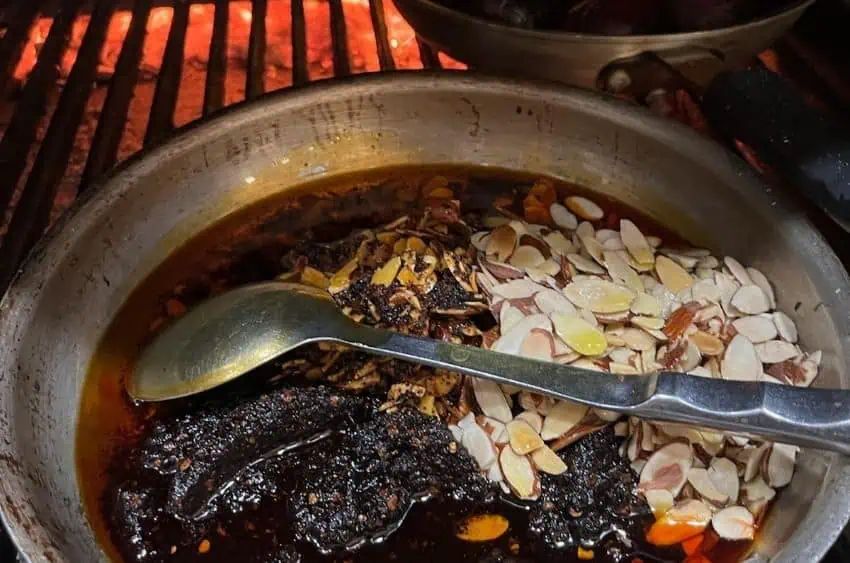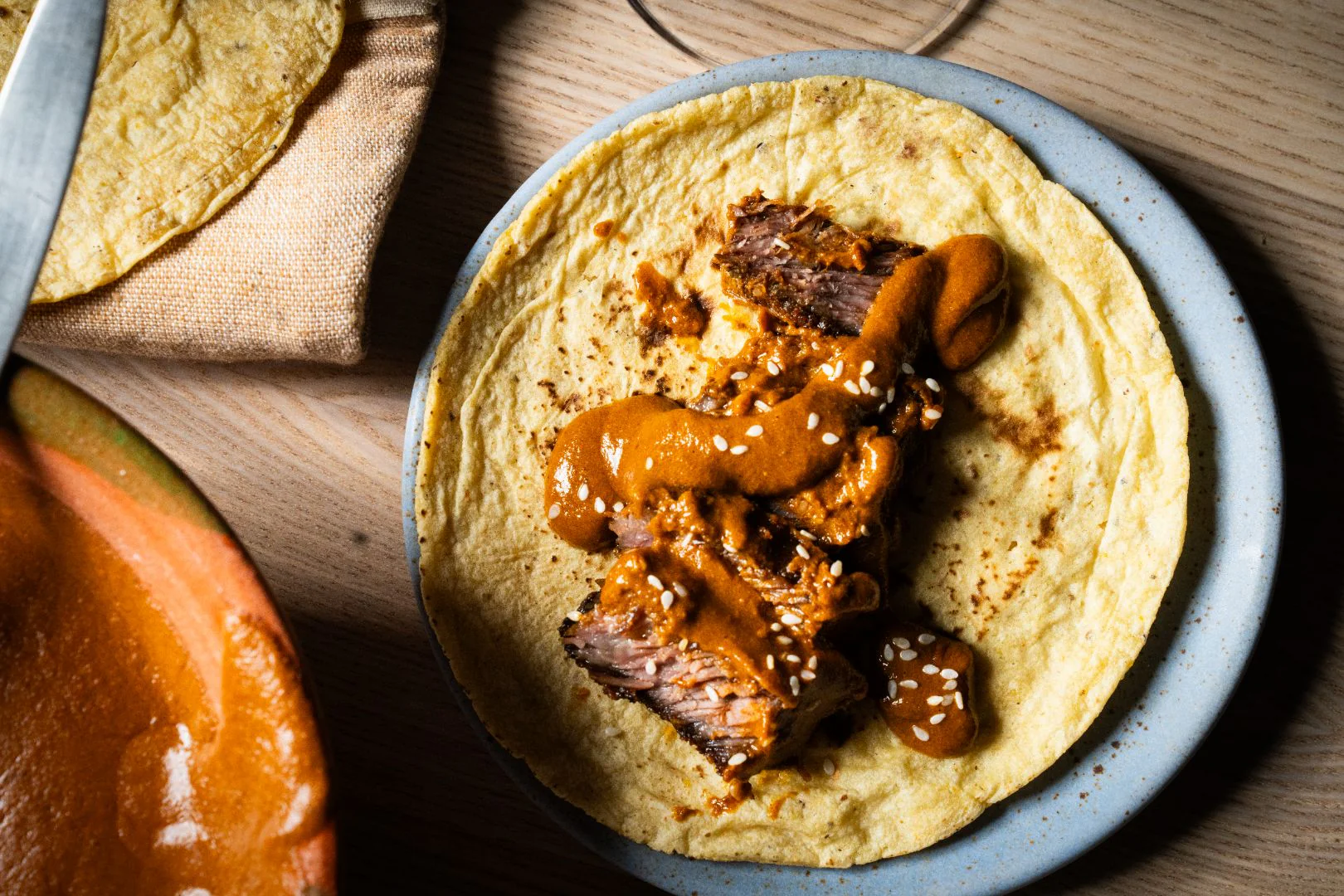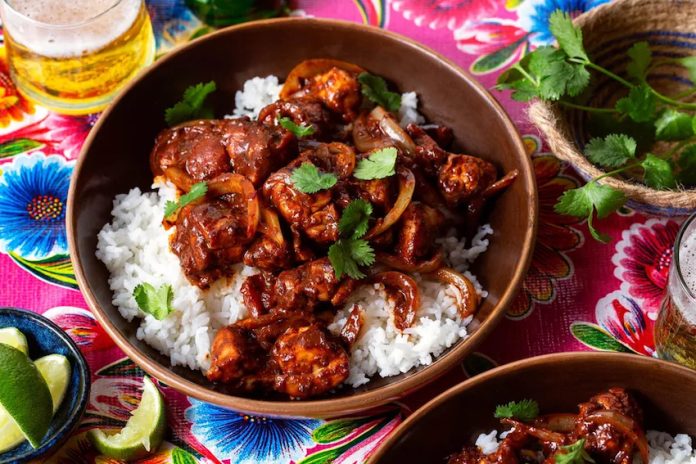Mole, a rich and complex sauce deeply embedded in Mexican culture, stands as a culinary “sacred cow” for many reasons. Historically, mole is more than just a dish; it’s a cultural artifact, tracing back to the pre-Hispanic era and evolving through the centuries under the influence of both Indigenous and Spanish culinary traditions. The word “mole” originates from the Nahuatl word “mōlli,” meaning sauce or concoction. This term reflects the complex, blended nature of the dish, which is a cornerstone of traditional Mexican cuisine, rich in ingredients and cultural significance.
The preparation of mole is a labor-intensive process, often reserved for special occasions like weddings, birthdays and major holidays, which underscores its cultural significance. Making mole involves a ceremonial-like devotion to selecting and handling its numerous ingredients — sometimes up to 30, including chilies, spices, herbs and chocolate. This painstaking process is a rite passed down through generations, imbued with familial and regional pride.

Reinventing a Mexican classic
There are some Mexican chefs who dare to experiment with this sacred cow of a sauce, like Elena Reygadas of Rosetta in Mexico City, named World’s Best Female Chef in 2023. Her recipe for pink mole with beets and radicchio infuses contemporary flair into classic mole. By experimenting with local herbs and ingredients, her menu creatively reflects the dynamic changes of the seasons. Then there’s Ricardo Muñoz Zurita, with his roasted duck enchiladas with black mole. A chef and culinary historian, Muñoz Zurita delves into Mexico’s diverse mole traditions at his restaurant Azul, blending rare regional ingredients and forgotten techniques to both preserve and innovate the heritage of mole.
In the spirit of these innovative chefs, I’d like to offer up two of my favorite mole recipes that are, let’s say, off the beaten path.

Mole Poblano Ribs
Ingredients:
2 racks of pork ribs (about 4-5 pounds)
Salt and black pepper to taste
1 tablespoon olive oil
1 onion, finely chopped
3 cloves garlic, minced
1 cup prepared mole Poblano paste
2 cups beef broth
1 tablespoon apple cider vinegar
1 tablespoon brown sugar
1/2 teaspoon smoked paprika (optional)
Directions:
Preheat your oven to 300 F (150 C).
Remove the membrane from the back of the ribs if it’s still attached. Season both sides of the ribs generously with salt and black pepper.
To make the mole sauce, heat the olive oil in a large saucepan over medium heat. Add the chopped onion and garlic, sautéing until they are soft and translucent.
Stir in the mole paste, mixing well with the onions and garlic.
Slowly add the beef broth, apple cider vinegar, brown sugar, and smoked paprika if using. Bring the mixture to a simmer and cook it until slightly thickened, about 10-15 minutes.
Place the ribs in a large roasting pan or on a baking sheet lined with foil.
Pour the mole sauce over the ribs, making sure they are well coated.
Cover the ribs with another piece of foil and seal the edges to create a tight wrap. This will keep the moisture in and allow the ribs to steam in the mole sauce.
Bake in the preheated oven for about 2.5 to 3 hours, or until the ribs are tender and the meat easily pulls away from the bone.
Optional:
For a caramelized finish, preheat an outdoor grill to medium-high heat.
Remove the ribs from the oven and place them on the grill. Grill for about 5 minutes on each side, basting frequently with any remaining mole sauce, until they are nicely caramelized.
Let the ribs rest for a few minutes before cutting between the bones. Serve hot, garnished with fresh cilantro and sesame seeds if desired.
Enjoy your mole ribs as a fusion of traditional barbecue and Mexican cuisine, bringing a unique and flavorful twist to your dining table!

Mole Milkshake
(I’m going to lose some friends over this one but it is absolutely a new take on traditional mole recipes!)
Ingredients:
2 cups vanilla ice cream
1/2 cup milk
1 tablespoon prepared mole paste (see note)
1 teaspoon cocoa powder
1/2 teaspoon cinnamon
Whipped cream (for topping)
Chocolate shavings or a sprinkle of sesame seeds (for garnish)
Note: I recommend choosing a darker mole, as they tend to be sweeter — a good match for this recipe.
Directions:
In a small bowl, mix the mole paste with cocoa powder and cinnamon. Add a small amount of milk to make it easier to blend.
In a blender, combine the vanilla ice cream, the remaining milk and the mole flavor base. Blend until smooth.
If the milkshake is too thick, add a bit more milk and blend again. Taste and adjust the seasoning, adding more cinnamon or cocoa if desired. To serve, pour the milkshake into a tall glass. Top with whipped cream and garnish with chocolate shavings or sesame seeds for an extra layer of mole flavor.
Serve immediately. Optional: tell your Mexican friends of the sin you just committed — or don’t, and we can just keep this between you and me.
Stephen Randall has lived in Mexico since 2018 by way of Kentucky, and before that, Germany. He’s an enthusiastic amateur chef who takes inspiration from many different cuisines, with favorites including Mexican and Mediterranean.
